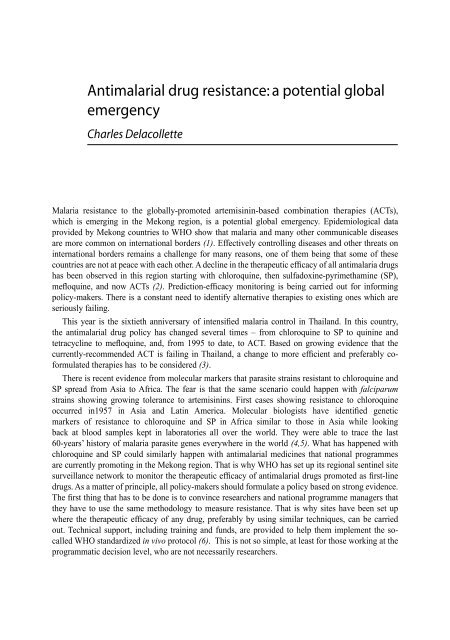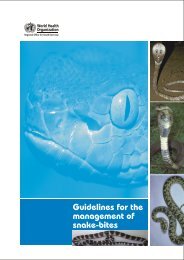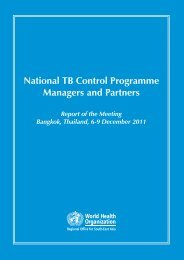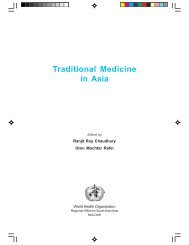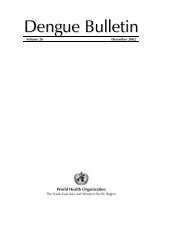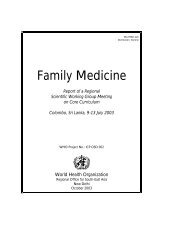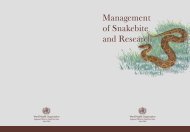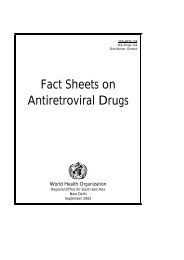South-East Asia Regional Conference on Epidemiology
South-East Asia Regional Conference on Epidemiology
South-East Asia Regional Conference on Epidemiology
You also want an ePaper? Increase the reach of your titles
YUMPU automatically turns print PDFs into web optimized ePapers that Google loves.
Antimalarial drug resistance: a potential global<br />
emergency<br />
Charles Delacollette<br />
Malaria resistance to the globally-promoted artemisinin-based combinati<strong>on</strong> therapies (ACTs),<br />
which is emerging in the Mek<strong>on</strong>g regi<strong>on</strong>, is a potential global emergency. Epidemiological data<br />
provided by Mek<strong>on</strong>g countries to WHO show that malaria and many other communicable diseases<br />
are more comm<strong>on</strong> <strong>on</strong> internati<strong>on</strong>al borders (1). Effectively c<strong>on</strong>trolling diseases and other threats <strong>on</strong><br />
internati<strong>on</strong>al borders remains a challenge for many reas<strong>on</strong>s, <strong>on</strong>e of them being that some of these<br />
countries are not at peace with each other. A decline in the therapeutic efficacy of all antimalaria drugs<br />
has been observed in this regi<strong>on</strong> starting with chloroquine, then sulfadoxine-pyrimethamine (SP),<br />
mefloquine, and now ACTs (2). Predicti<strong>on</strong>-efficacy m<strong>on</strong>itoring is being carried out for informing<br />
policy-makers. There is a c<strong>on</strong>stant need to identify alternative therapies to existing <strong>on</strong>es which are<br />
seriously failing.<br />
This year is the sixtieth anniversary of intensified malaria c<strong>on</strong>trol in Thailand. In this country,<br />
the antimalarial drug policy has changed several times – from chloroquine to SP to quinine and<br />
tetracycline to mefloquine, and, from 1995 to date, to ACT. Based <strong>on</strong> growing evidence that the<br />
currently-recommended ACT is failing in Thailand, a change to more efficient and preferably coformulated<br />
therapies has to be c<strong>on</strong>sidered (3).<br />
There is recent evidence from molecular markers that parasite strains resistant to chloroquine and<br />
SP spread from <str<strong>on</strong>g>Asia</str<strong>on</strong>g> to Africa. The fear is that the same scenario could happen with falciparum<br />
strains showing growing tolerance to artemisinins. First cases showing resistance to chloroquine<br />
occurred in1957 in <str<strong>on</strong>g>Asia</str<strong>on</strong>g> and Latin America. Molecular biologists have identified genetic<br />
markers of resistance to chloroquine and SP in Africa similar to those in <str<strong>on</strong>g>Asia</str<strong>on</strong>g> while looking<br />
back at blood samples kept in laboratories all over the world. They were able to trace the last<br />
60-years’ history of malaria parasite genes everywhere in the world (4,5). What has happened with<br />
chloroquine and SP could similarly happen with antimalarial medicines that nati<strong>on</strong>al programmes<br />
are currently promoting in the Mek<strong>on</strong>g regi<strong>on</strong>. That is why WHO has set up its regi<strong>on</strong>al sentinel site<br />
surveillance network to m<strong>on</strong>itor the therapeutic efficacy of antimalarial drugs promoted as first-line<br />
drugs. As a matter of principle, all policy-makers should formulate a policy based <strong>on</strong> str<strong>on</strong>g evidence.<br />
The first thing that has to be d<strong>on</strong>e is to c<strong>on</strong>vince researchers and nati<strong>on</strong>al programme managers that<br />
they have to use the same methodology to measure resistance. That is why sites have been set up<br />
where the therapeutic efficacy of any drug, preferably by using similar techniques, can be carried<br />
out. Technical support, including training and funds, are provided to help them implement the socalled<br />
WHO standardized in vivo protocol (6). This is not so simple, at least for those working at the<br />
programmatic decisi<strong>on</strong> level, who are not necessarily researchers.


